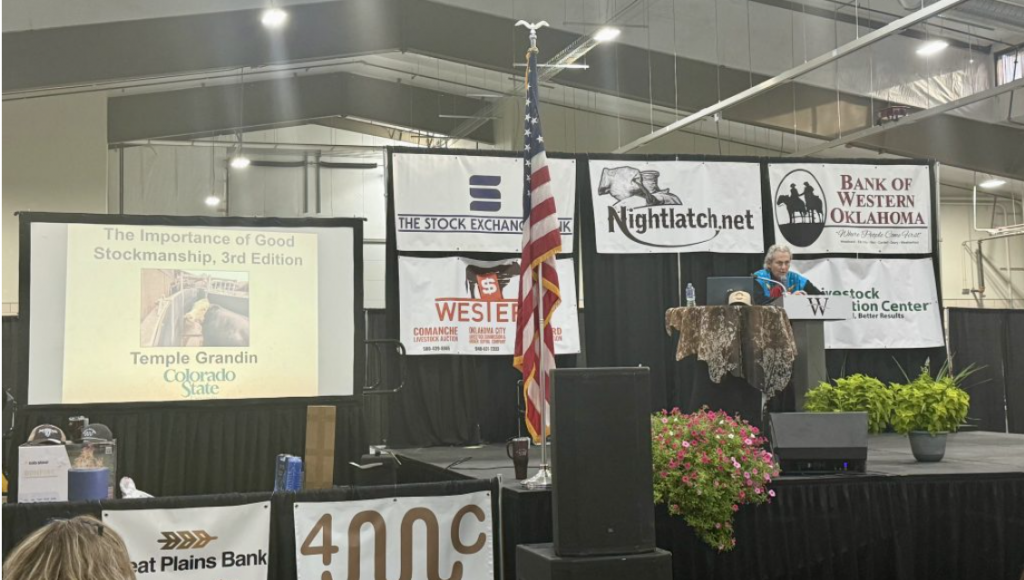
Listen to Temple Grandin and Karleigh’s conversation above!
Dr. Temple Grandin, renowned animal behavior expert and animal science professor at Colorado State University, recently shared her insights on how livestock handling has evolved over the years and what challenges remain today with Oklahoma Farm Report Intern, Karleigh Erramouspe at the recent 580 Cattle Conference. Grandin highlighted the crucial role of calm, knowledgeable handlers combined with increasing awareness of genetic health problems in livestock.

“First of all, people need to calm down, because when cattle get all scared and excited, it takes 20 minutes to calm down,” Grandin began, emphasizing that skilled livestock handling starts with composure. She explained that understanding animal behavior is equally important: “You need to learn some of the basic behavioral principles, like how the flight zone works, point of balance works, and working on the edge of the flight zone. Then, when they move where you want them to go, back off.”
Grandin shared practical advice on minimizing stress caused by the environment: “You bring cattle in and they stop halfway up the chute, they might be seeing a reflection on a vehicle’s bumper. Well, then move that vehicle, or a little piece of string, something like that, will stop them. Take those distractions out of facilities.” Adding to this, she recommended low-stress movement techniques, saying, “I showed a little movement pattern when you walk back by the cattle in the opposite direction to get them to go forward. That can really help on getting them to move forward in chutes, those are just some real simple things people can start to do. And no yelling. Calm down. Stop the yelling.”
Reflecting on changes in livestock handling, Grandin said, “Oh, people have gotten a lot better, a lot less prod use, calming everything down. You know, they’re sending people out for training. There’s a lot of workshops that are being put on, on low stress handling. There’s been a lot of improvements in the last 20 years of handling. That’s the thing that’s really improved. That’s the bright spot.”

Grandin also discussed emerging concerns related to animal health and breeding practices. She pointed out, “People, awareness is one of them. Also, I think you need to be measuring things. I’m very concerned about this lameness that’s slowly gotten worse, that has a very strong genetic component, the heart failure problems that I’ve discussed in my talk, used to just be high altitude sickness at 10 or 12,000 feet. Now it’s happening at much lower altitudes.”
Expanding on the genetic aspect, she explained, “Anecdotally, feed yards that do beef on dairy, which is an Angus by Holstein cross, have traced late stage deaths, which are congestive heart failure, dead, back to single bulls. So it’s very definitely, it’s a strong genetic component, and it’s related to just over selection of some of the production traits.”

Dr. Grandin shared that progress is possible when handlers calm down, apply straightforward behavioral principles, continually educate themselves, and pay greater attention to genetics in breeding decisions.
Dr. Grandin has several books available on livestock handling, you can check out her website here:

















